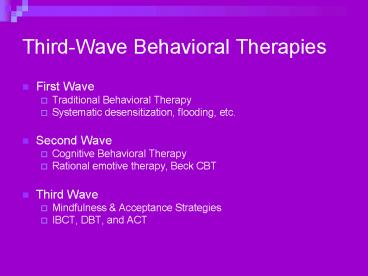ThirdWave Behavioral Therapies - PowerPoint PPT Presentation
1 / 8
Title:
ThirdWave Behavioral Therapies
Description:
Cognitive Behavioral Therapy. Rational emotive therapy, Beck CBT. Third Wave ... Cognitive psychology, animal models. Focus on language. The dark side ... – PowerPoint PPT presentation
Number of Views:1006
Avg rating:3.0/5.0
Title: ThirdWave Behavioral Therapies
1
Third-Wave Behavioral Therapies
- First Wave
- Traditional Behavioral Therapy
- Systematic desensitization, flooding, etc.
- Second Wave
- Cognitive Behavioral Therapy
- Rational emotive therapy, Beck CBT
- Third Wave
- Mindfulness Acceptance Strategies
- IBCT, DBT, and ACT
2
What are Mindfulness Acceptance Strategies?
- Mindfulness
- Being aware of your present moment
- You are not judging, reflecting or thinking
- You are simply observing the moment in which you
find yourself - "Wherever you go, there you are"
- Acceptance
- Rather than attempting to change or eliminate the
negative feeling learning to accept it - Being productive despite feeling depressed,
anxious, etc.
3
Integrative Behavioral Couples Therapy
- Combines traditional behavioral strategies with
new acceptance strategies - Behavioral Strategies
- Behavior Exchange
- Problem Solving
- Communication Skills
- Acceptance Strategies
- Empathic Joining
- Detachment
- Tolerance Building
- Greater Self-Care
4
Dialectical Behavioral Therapy
- Traditionally used for difficult to treat
disorders such as borderline personality disorder - Combines traditional behavioral therapy with
mindfulness practices - Focus on the idea of a dialectic need for a
balance between two extremes such as validation
of client and encouragement for client to change - Employs strategies to help clients understand
these dialectics and learn to find a balance
between the two extremes
5
ACT
- Based on Relational Frame Theory
- Research program examining how the human mind
works - Cognitive psychology, animal models
- Focus on language
- The dark side
- Suffering as common to the human experience
- Not indicative of abnormal processes
- Based on precedence of psychological symptoms
disorders
6
The ACT methods
- Mindfulness
- Stems from Eastern religions
- Modern conceptualization
- Present moment
- Thought diffusion
- Acceptance
- Trying to rid yourself of psychological pain
often amplifies it - Willingness to live life according to values even
with suffering - Values-based living
- Living in accordance with beliefs, despite
difficulty - Use of metaphors
- Distancing from language to experientially
demonstrate rather than persuade
7
Acceptance Commitment Therapy
8
ACT Question
(6) at this time, in this situation?
(2) are you willing to have that stuff, fully and
without defense
(5) of your chosen values
If the answer is yes, that is what builds...
(4) AND do what takes you in the direction
(3) as it is, and not as what it says it is,
(1) Given a distinction between you and the stuff
you are struggling with and trying to change































